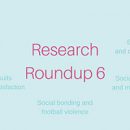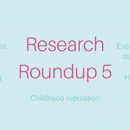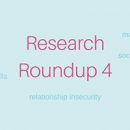The danger of viewing everything exclusively through a scientific lens, rather than looking at things in the spirit of truth – what we might call ‘wise science’ – is that it splinters reality excessively. It loses the bigger picture. We become wiser when we understand not just the parts but also the living, wider patterns […]
Psychology Research Therapy Articles by Mark Tyrrell
Although human problems are as old as the hills, it is useful for practitioners to keep up to date with psychological research. We all need to better understand the human condition. Here you’ll find what I hope are entertaining pieces on recent studies and my take on what they might mean in practical terms for ourselves and our clients’ lives. Unless we can make sense of study findings and see how they fit into a bigger understanding of what it means to be human then all the research in the world may be worthless.
Research Roundup 12
Research showing yoga can help depression in the long as well as short term, evidence that we can create fake news in our heads, a study looking at depression in the final year of life, what helps with impostor syndrome, and an exploration of what love does to the mind and body.
Research Roundup 11
This new study! That new study! We feel we’re getting closer to understanding human nature. But the wider context of what it means to be human can be missed unless we can be discerning and start to see more broadly.
Research Roundup 10: Psychiatric Diagnosis Discredited, Universal ‘Oneness’, Relationship Types and More
We are bombarded by new psychological facts every day, but we need to fit them together into a bigger pattern of what it means to be human if we are to gain any real wisdom from this information.
Research Roundup 9: Forgiveness, Depression Genes, Nature and Stress, Hypnosis and Dementia, and Pre-Op Hypnosis
The latest instalment of recent psychology research looks at why we’re prone to forgive other people, research that seems to debunk the old ‘depression genes’ theory, exactly how often we need to feel connected to nature to lower stress, and how hypnosis can help alleviate symptoms of dementia and calm pre-op patients more than pills.
Research Roundup 8: Teen Stress, Cultural Engagement for Depression, Humour in Marriage, Mindfulness for Anxiety, and Restorative Hypnosis
A look at recent research that explores the many ways humans can feel better.
Research Roundup 5: Depressed Language, 5-Year Olds’ Reputations and Do You Phub People?
An exploration of some recent findings from the world of psychology research.















